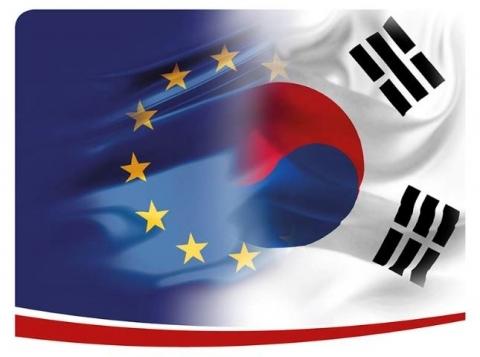European Economic
and Social Committee
Civil society representatives celebrate the 10th anniversary of the EU-Korea Free Trade Agreement with a debate on labour issues
The European Economic and Social Committee (EESC) hosted on 12 April the 7th meeting of the EU-Korea Civil Society Forum, an online event that gathered civil society representatives to discuss on labour-related issues, including working hours, civil dialogue and the state of play of the implementation of international standards and conventions (ILO). Participants also celebrated the 10th anniversary of the implementation of the EU-Korea Free Trade Agreement (FTA).
The EU-Korea Civil Society Forum (CSF) gathered for the first time since 2018 the members of the EU Domestic Advisory Group (DAG) and the Korea DAG, both established by the EU-Korea Free Trade Agreement implemented since 2011. Participants discussed labour-related challenges and opportunities ahead in the EU and Korea and especially the implementation of international standards and conventions, this issue topping the bilateral agenda in the enforcement of the FTA context.
Tom Jenkins, special advisor of the European Trade Unions Confederation (ETUC) and co-chair of the meeting from the EU side, introduced the meeting reminding the importance of having the meeting back-to-back with the meeting of the Parties to the Agreement, which would take place the following day.
His counterpart from the Korean side, Hogeun Lee, moderated the first panel, focused on the different rules on working hours. Stefan Thewissen, representative of the OECD, explained that Korea has a long-working hours' culture, a practice that has been reduced to adapt to the international standards, but that "has not been eradicated" so far. Jung-Yup Yoo, from the Korean Trade Unions Federation, listed the negative consequences of this culture in terms of productivity, life-work imbalances, work-related accidents and the creation of new jobs.
Bertrand Muller-Schleiden, from the Directorate General for Employment, Social Affairs and Inclusion of the European Commission and Hyung-Jun Lee, from the Korea Employers Federation, spoke about the difficulties to implement the necessary reforms to adapt the labour legislation to the international standards.
The second panel focused on the topic of social dialogue as a driver for future development. Konstantinos Papadakis and Karen Curtis, representatives from the International Labour Organisation (ILO) highlighted the importance of social dialogue as well as of the ratification of international conventions and standards and the helpful role the ILO can play for this. However, the most important thing is to change the political will, and that is something that cannot be legislated
, said Mr Papadakis.
From the Korean side, Heungjun Jung, Professor at the Seoul University of Technology, stressed the potential of social dialogue, but also its limitations, such as the "lack of a long-term perspective or stability". Isabelle Barthès, representative of the European Trade Union IndustriAll, presented the current trends of collective bargaining in Europe, while other speakers presented concrete examples from Slovakia, Poland or the Republic of Korea.
Conclusions of the Civil Society Forum
Participants in the EU-Korea Civil Society Forum adopted a document with conclusions that will be presented to the EU and Korea Parties of the Agreement and also serve as a basis for the work of the respective DAGs. In this document, members underline the importance of combatting the long working-hour culture existing in Korea to improve workers' health, productivity and wellbeing, while recognising the efforts made so far by Korean authorities with the 2018-2021 reform that has brought working time regulation in line with dominant OECD practice.
In the field of the ratification of the ILO Conventions, both sides agree to mutually support each other, as these ratifications are "an important step in establishing labour rules and systems that are in line with international standards".
In terms of social dialogue, the CSF refers to the Conclusions of its 6th meeting in Seoul in April 2018, requesting both Parties to "engage constructively in social dialogue with representatives of employers and workers on issues of designing and applying labour and employment policy and law". The adopted document also emphasizes that social dialogue is the ILO's governance paradigm for addressing contemporary socio-economic challenges, achieving internationally set objectives such as the 2030 Agenda for Sustainable Development and the Sustainable Development Goals, and making a firm contribution to attaining social justice around the world
.
Finally, the conclusions of the CSF also mention the role of the DAGs in the monitoring of the Trade and Sustainable Development chapter of the FTA: The CSF expects working further for enabling civil society, including the Social Partners, to play a greater role in implementation and will examine whether additional measures are needed to ensure the full and effective implementation of the TSD chapter and ensure that the FTA benefits to sustainable development, human rights, labour rights and environmental commitments
, says the document.
The meeting of the CSF will be completed on 13 April with a workshop on the topic of "Circular economy and the recycling of batteries".
